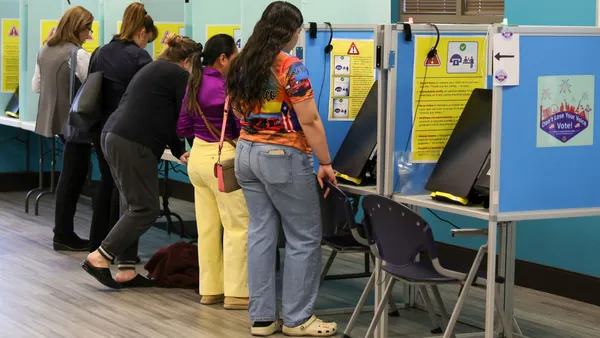Dive Brief:
- A bill winding through California’s legislature would require public and private colleges in the state to create revenue-sharing agreements to pay their athletes.
- Institutions would need to set up “degree completion funds” for players, who could then access up to $25,000 per year. Colleges would calculate how much to put in the funds by taking half of the revenue earned from each sport and splitting it up among athletes, then subtracting the amount of sports scholarship aid an athlete receives.
- The proposal stops short of defining athletes as employees and would likely only benefit those who play on teams that generate a large amount of revenue. Still, experts say it would contribute to the breakdown of the NCAA’s eroding amateurism model of postsecondary athletics.
Dive Insight:
California has been at the vanguard of a movement to expand college athletes' rights. It was the first state in the U.S. to sign a law in 2019 that allowed them to be compensated for their names, images and likeness.
Observers largely credit the legislation with jump-starting waves of similar bills across the U.S. and forcing the NCAA to issue its own name, image and likeness, or NIL, rules. The association had refused to create NIL policies, saying players earning money because of their status as athletes clashed with the amateurism of collegiate sports.
California’s new bill would go beyond approval of NIL compensation. In addition to athletes being able to access up to $25,000 a year from their degree completion funds, colleges would have to pay players any remaining money in their funds once they graduate.
Athletes would forfeit their funds if they transfer to an in-state community college or to an institution outside California, if they don’t finish their undergraduate degree within six years or if they leave their athletics program.
The California Senate Appropriations Committee this week put the bill in what’s known as a suspense file, a repository for legislation deemed to have significant fiscal effects. This still allows it to receive a vote on the Senate floor.
The Senate committee’s financial analysis of the bill states it would cost the University of California System an estimated $34 million to $36 million a year. The California State University System said it would cost $1 million to about $9 million a year for its nine campuses that participate in Division I athletics — amounting to between 17% and 34% of the athletics revenue at those institutions.
The UC system said it would cost about $1.4 million a year to hire an employee on each campus to manage the funds, while Cal State said it would cost $3.3 million a year to do the same.
Cal State also indicated male athletes would receive more money than female players, potentially putting it out of compliance with Title IX, the federal law banning sex-based discrimination and requiring equity in athletics.
B. David Ridpath, a sports business professor at Ohio University, said he doesn’t believe the proposal raises Title IX concerns. He said he viewed Cal State’s statement as a scare tactic to push against the bill and that many female athletes have high market value.
Ridpath called the proposal a positive step and “disruptor” to the college athletics space and said he expects other states might follow California’s lead.
The NCAA is soon reaching a point in which it will need to bargain directly with athletes, Ridpath said.
“It comes down to the NCAA trying to hold onto this amateurism,” he said.
Ridpath said the NCAA has been unclear on these issues. It adopted interim NIL policies in June 2021 and this month revamped them in an attempt to ensure boosters would not try to incentivize prospective and current athletes to attend certain colleges with money disguised as NIL-related transactions. This has reportedly been taking place.
State NIL bills have also differed dramatically from each other, creating a complex legislative patchwork and effectively spurring an arms race to be competitive in the athletics space. States didn’t want to lose athletics advantages by having strict measures or bills that took effect later than others.













